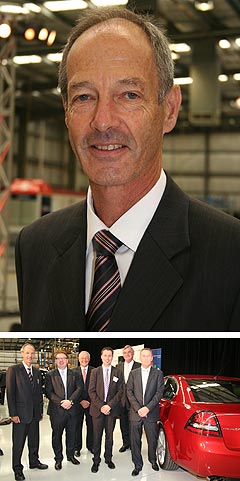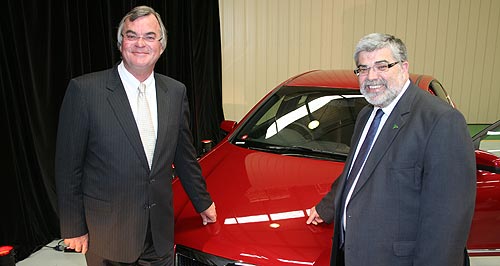News - General News - EmissionsConsortium to build electric Commodore test fleetElectric dreams: EV Engineering chairman Rob McEniry (left) and innovation and industry minister Kim Carr announce the plans to research EVs in Australia. Former Holden execs head new company to develop EV technologies for Australia18 Feb 2011 A CONSORTIUM of five leading Australian automotive suppliers with global connections has formed a company to drive engineering research into electric vehicles – a $26 million project that they hope will not only generate cutting-edge technologies but culminate in an Australian-built rear-drive electric large car. The new Melbourne-based company, EV Engineering Limited, says it will build seven proof-of-concept full-electric Holden Commodores by the middle of 2012, funded partly by a $3.5 million grant from the federal government’s now defunct Green Car Innovation Fund (GCIF). Holden is involved only on the periphery of the project by providing some engineering support and use of its Lang Lang proving ground, but the new company has strong Holden flavour, with several former Holden senior executives heading the project, including Rob McEniry and Ian McCleave. Among the major partners in the consortium are automotive component suppliers Futuris and its partner Air International, Bosch and Continental, along with EV charging network company Better Place Australia. Each are providing both financial and technical support. Along with Holden, the CSIRO will provide technical expertise.  Top: EV Engineering CEO and director Ian McCleave. Bottom: The EV Engineering directors at the launch of the new company in Melbourne. Top: EV Engineering CEO and director Ian McCleave. Bottom: The EV Engineering directors at the launch of the new company in Melbourne.The partners all see the project as a way of helping to secure the future of the car industry in Australia, which traditionally has revolved around large rear-drive cars – vehicles regarded as most threatened by rising fossil fuel costs. Once the electric test Commodores are built, they will be added to the fleets of the partner companies for field trials. GM Holden director external communications Emily Perry, who attended the company announcement at Futuris’s head office in Port Melbourne today, said Holden was not a direct partner in the venture but was providing support. “We are keen to see the technological viability and how the project goes, but there are no plans for us to put this into production at this stage. “It is very ‘future-scoping’, if you like.” Although the federal government has killed the GCIF and diverted future funding to flood damage restoration, this new project managed to squeeze through the door before it was slammed shut. Announcing the grant, innovation and industry minister Kim Carr said the global electric vehicle market would be worth $2 trillion by 2020, and that Australia needed to take action to share in that business or risk being left behind. He said that although the GCIF had been discontinued, the government would continue to fund the transformation of the motor industry to ensure that Australia remained one of only 15 countries with the capability of taking a new vehicle from concept to production. Mr Carr said he was particularly interested in maintaining Australia’s motor industry as a major export force to markets such as the Middle East. EV Engineering is recruiting a staff of up to 20, including about 10 engineers, for the EV project which will be based in Victoria with an engineering workshop being set up in part of Futuris/Air International’s warehouse. Chairman of the new company is former Holden executive director and ex-managing director of Mitsubishi Motors Australia Limited Rob McEniry, while CEO is former Holden executive director of planning and program management, Ian McCleave, an engineer who resigned from Holden in July 2007 to pursue other projects in alternative fuels. Chief engineer is former Holden senior engineer Tim Olding. Also on board is another Holden director Ralph Stevenson. Mr McCleave said the company was not planning to build electric vehicles on a commercial basis, but to generate the technology for others to do so. “We haven’t got any plans at all for mass production,” he said. “This is about testing the concept and to test the market. “Our intention is not to become a major manufacturer. We are a small EV engineering company, so we will be looking to grow our capability and to work on other projects.” One of the major technology spin-offs of the project might be in safety systems in areas such as electronic stability control. This aspect of the project will be done by consortium partner Bosch, who has 80 engineers in Australia working on such systems for conventional internal combustion engine vehicles. Such work on EV vehicles is in its infancy, and as Bosch is the world’s leading supplier of such safety electronics and components, it could have far-reaching implications for producers of rear-drive vehicles looking to venture into electric propulsion. Bosch Australia regional president of powertrain and chassis systems Gavin Smith said each of the consortium members was making a clear statement with their commitment to the new venture. “They believe there is a place for the Australian industry to participate in the exciting new developments surrounding the electrification of the motor vehicle,” he said. “By developing the skills and capability here, the partners will be in a good position to exploit opportunities as vehicle manufacturers further extend their portfolio of electric vehicles.” The concept for the EV consortium is believed to be the brainchild of EV charging infrastructure company Better Place, headed by former Labor state politician Evan Thornley and Alison Terry - the latter a former Holden executive director of corporate affairs. Better Place, which is set to start roll-out of its national charging and battery-switching network in Canberra late this year, will provide charging technology support. Mr Thornley said large-car owners had the most to gain from switching to electric propulsion, as they spent the most money on fuel. He said Australia was in a unique position to take a lead role in rear-drive electric vehicle development, as Australia’s motor industry was largely built around such vehicles.  Read more |
Click to shareGeneral News articlesResearch General News Motor industry news |















Facebook Twitter Instagram